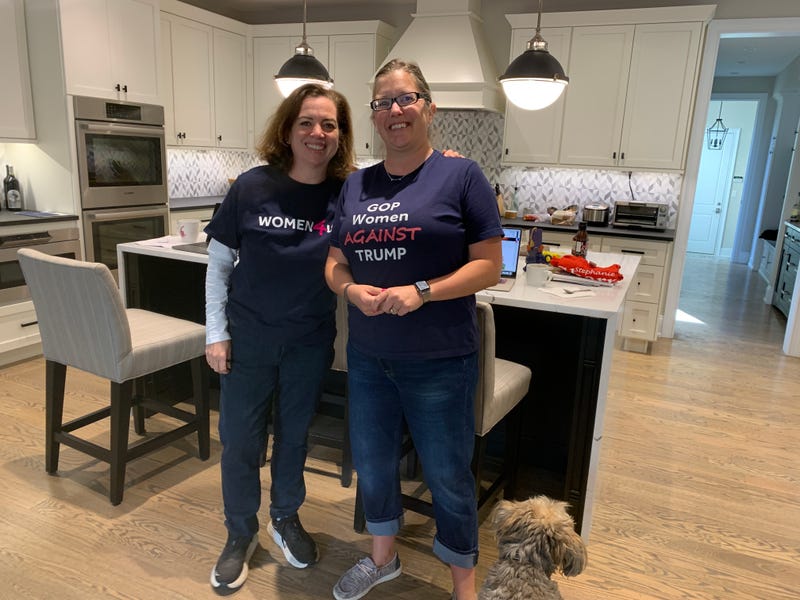
PHILADELPHIA (KYW Newsradio) — One recent afternoon in Amtrak’s 30th Street Station, a woman was going from waiting passenger to waiting passenger, asking each one if they had a plan to vote.
One passenger chuckled and said, “I’m from New York and I came here to do exactly what you’re doing.”
The first woman chuckled too. “I’m waiting for my train back to Massachusetts,” she said.
So many out-of-state volunteers came to Pennsylvania to canvass. It was perhaps inevitable they’d end up canvassing each other.
Voters in safe blue states said they wanted to have more of an impact on the outcome of the race and Pennsylvania, as the largest swing state, seemed the logical place to put their effort.
“This is the most important election of our lives. Frankly, this is the most stressed I’ve ever been about an election, so I wanted to do whatever I could in what seems to be the most important place I can contribute,” said Steve Golub, who flew from California to knock on doors in Erie and Bucks County.
Even people in safe red states came to canvass for the Harris-Walz ticket. Leaders of Women4US, a group of Republican women encouraging other Republican women to cross party lines in this election, came from Texas and Kansas to the Philadelphia suburbs.
“If you have 100 units of energy, what is the best and most effective use of that,” explained co-founder Stephanie Sharp. “In Pennsylvania, all of you are holding us on your backs because you’re voting for the rest of us in the 43 non-swing states. That’s part of the message, that your vote is so important and it’s not just for you that you’re voting.”
The Pennsylvania director of the Harris-Walz campaign, Brendan McPhillips, says he has no idea how many volunteers came from out of state to help the ticket. Many of them didn’t work directly with the campaign (like Women4US) and McPhillips says the campaign didn’t keep a tally of those who did (like Golub). But he said he appreciated their joining the 110,000 Pennsylvania residents who’ve volunteered.
“We’re really grateful that people know how high the stakes are here in the Commonwealth,” he said. “The biggest advantage we have is we have actual supporters on the ground having face-to-face conversations with people, which is one of the most important tools we have.”
There does not appear to be a comparable phenomenon for the Trump campaign, though it has benefitted from one very high-profile visiting volunteer, Elon Musk, who’s spending $119 million on, among other things, paying canvassers and holding a lottery, now the subject of a lawsuit by District Attorney Larry Krasner, with a daily million dollar prize for voters signing a pledge of support for the First and Second Amendments of the Constitution.
Door-knocking is hard and often thankless work. Golub says he knocked on perhaps 500 doors and thought he may have swayed or motivated one or two voters. Still, he considered it worthwhile.
“I knew I wasn’t changing the world or the campaign but I also knew the logic was, you multiply the one or two people that are persuaded by millions of people who are door-knocking and that adds up to what could make the difference,” he said.
Alan Chang, also from California, essentially moved into Philadelphia in July. He’s a volunteer with “Conversations for Change,” which does what he called “deep canvassing” — extended conversations with voters where canvassers not only ask questions but share their own experiences and values.
The group has targeted an area of West Philadelphia, where voting turnout is below average, with the goal of increasing participation. He says 90% of the 300 volunteers are from other states but they’ve shown early signs of success.
“Looking at vote by mails, 13.5% of Pennsylvania turned in their vote by mail (as of last week),” he said. “In Philly, that’s a little higher, around 16%, and then our ward that we’re working on is 18% so we’re blowing out all the other rates because we’ve actually reached out to these people and had an effect on them.”
Golub says he got some pushback in Erie when he engaged a Trump supporter, who found it suspicious that someone would come from California to canvass in Erie.
“My response to him was, ‘Hey, as far as I know, this is still one country’,” he said.
Ironically, he said, his most moving conversation came from a non-voter.
“It was the end of a long drizzly day and instead of the person on the voter list we’d been assigned — who’d moved away — the person there was the father of a family of Kurdish refugees who’d just arrived in the country,” he recalled.
“They invited us in for some tea and he told us his story, which involved fleeing Syria when the civil war broke out there in around 2011 to the relative safety of the Kurdish part of Iraq. He was on the verge of being accepted into America as a refugee in 2017 when, what happened? Trump shut off immigration from a number of Muslim countries, including Syria, so they languished in Iraq for years and had finally gotten approval to come in.
“To my mind, that illustrated a big part of what this election is about. Whether we’re going to welcome or reject people like him and his family and whether we’re going to follow our better angels or our darker demons.”
